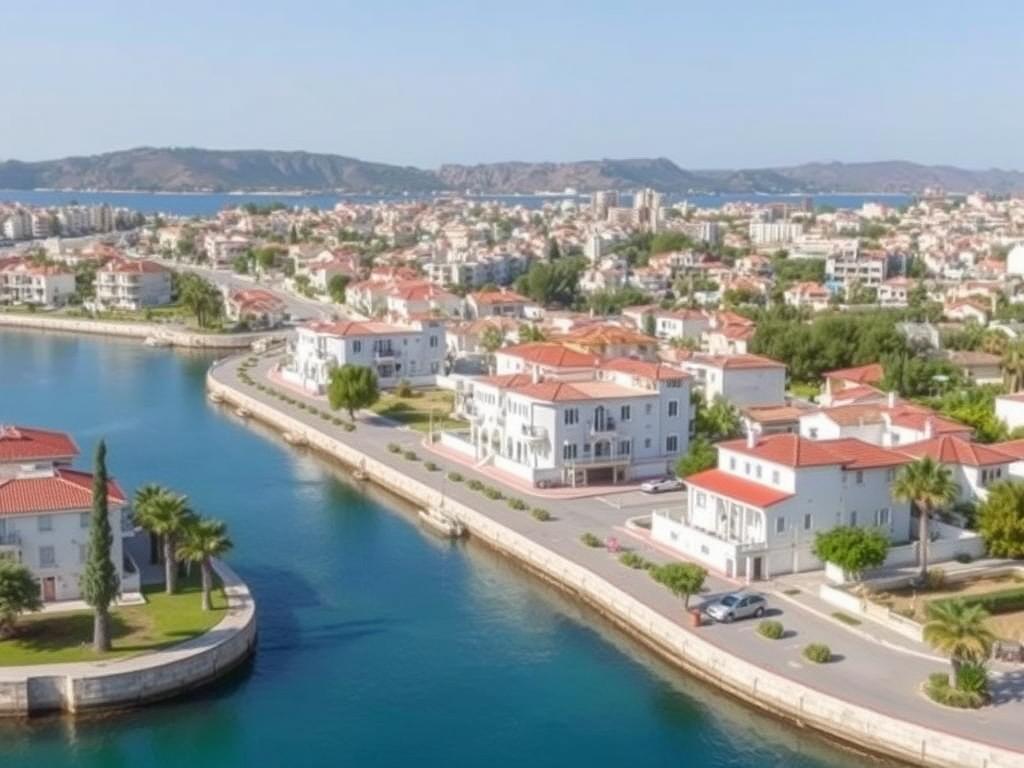Introduction to Infrastructure Development and Property Values in Cyprus
Cyprus has experienced considerable economic and social transformation over recent decades, in large part driven by infrastructure projects. These developments not only modernize transportation and utility networks but also wield substantial influence over the real estate market. The relationship between infrastructure projects Cyprus impact property dynamics is a critical area for investors, homeowners, and policy makers interested in the long-term trajectory of the island’s real estate assets.
Infrastructure inherently supports growth by enhancing accessibility, reducing travel times, and improving the quality of life. Consequently, Cyprus—strategically located in the Eastern Mediterranean—has prioritized expanding and upgrading its transport and public services networks. Highways, rail and bus networks, ports, and airports feature prominently in these efforts. Each new initiative contributes to reshaping cityscapes and suburbs, often translating into fluctuating property values.
Understanding how new infrastructure projects influence real estate is essential for making informed investment decisions. This article explores how infrastructure projects in Cyprus impact property values by dissecting various forms of infrastructure, examining case studies, evaluating short-term and long-term effects, and discussing ROI potentials tied to new developments.
Infrastructure developments are not merely physical upgrades; they fundamentally change the real estate landscape in Cyprus, embedding new value into properties connected by improved accessibility.
Overview of Major Infrastructure Projects in Cyprus
In recent years, Cyprus has witnessed a wave of infrastructure projects ranging from road expansions to public transport upgrades. These projects have been designed both with economic revitalization in mind and to serve the growing demand for sustainable urban living.
One signature project is the new highway Cyprus real estate observers closely monitor—extended and modernized highway corridors such as the A1 and A6 highways. These developments have dramatically reduced travel times between key cities including Nicosia, Limassol, and Larnaca. This has heightened accessibility for suburbs previously perceived as isolated.
Moreover, public transport developments Cyprus property experts regard highly are largely focused on bus network expansion and improvements, as well as considerations around future light rail systems. Although Cyprus lacks an extensive rail network, modernizing bus infrastructure and integrating multi-modal transport hubs are significant steps toward sustainable urban mobility.
Ports and airports are also central to Cyprus’s infrastructure agenda. The ongoing modernization of Larnaca and Paphos airports, along with investments in port facilities, enhance Cyprus’s positioning as a Mediterranean transport hub. These improvements attract both commercial activity and private investment, influencing local real estate markets.
The ripple effects of these infrastructure projects extend beyond transport—they reshape regional economies and redefine property market potential across Cyprus.
How Infrastructure Projects Affect Property Values
Infrastructure projects impact property values through well-understood mechanisms. Accessibility is the foundational driver: the easier it is to reach workplaces, schools, and commercial centers, the more desirable a location becomes. This dynamic plays out strongly in Cyprus, where infrastructure advances gradually overcome historical geographical divides.
Improved highways, new road links, and enhanced public transport options translate directly into reduced commuting times and increased connectivity. Areas previously considered peripheral often evolve into commuter-friendly suburbs, attracting buyers looking for affordable but accessible housing. This creates upward pressure on property prices in those regions.
Conversely, some infrastructure projects bring noise, pollution, or construction disruptions, which can temporarily depress nearby property values. However, in most cases, the long-term benefits—such as better access and increased economic activity—far outweigh short-term negatives.
Investment property appreciation Cyprus has seen in recent years frequently correlates with planned or completed infrastructure projects. Foreign and local investors follow infrastructure updates closely, targeting properties in zones slated to benefit from major transport or utility improvements.
Enhanced infrastructure transforms underutilized areas into investment hotspots by reducing isolation and unlocking commercial and residential potentials.
Case Study: New Highway Cyprus Real Estate Boom
The upgrade and extension of the A1 highway, linking Nicosia to Limassol, offers a clear example of infrastructure’s property impact. Prior to the project, the corridor suffered from congestion and slower travel times, deterring some commuters from settling in towns along the route.
Following the completion of this highway project, real estate agents and analysts noted an uptick in property demand in municipalities like Germasogeia and Yermasoyia, traditionally overshadowed by Limassol’s center. Faster commuting options made these areas attractive for middle-class professionals seeking more affordable housing without sacrificing access to urban amenities.
Table 1 below highlights property price trends in the corridor before and after the highway upgrade:
| Year | Average Property Price (€/m²) | Percentage Growth |
|---|---|---|
| 2015 (Pre-upgrade) | 1,200 | – |
| 2018 (During construction) | 1,350 | 12.5% |
| 2021 (Post-completion) | 1,600 | 18.5% |
This appreciation reflects increased demand, driven by the convenience of the improved highway network. It also illustrates a positive infrastructure property ROI Cyprus investors seek—where capital gains stem directly from physical accessibility changes.
Strategic highway expansions can catalyze real estate appreciation by transforming commuting patterns and regional desirability in Cyprus.
Public Transport Developments Cyprus Property Markets Respond To
While Cyprus’s public transport systems remain less developed compared to many EU countries, there has been substantial commitment to improving buses, designing park-and-ride systems, and enhancing cycling infrastructure. These shifts herald the beginning of a new era where public transport developments Cyprus property owners and buyers anticipate will enhance connectivity across urban and suburban areas.
The introduction of electric buses, timetable optimizations, and new bus routes have increased daily ridership and passenger satisfaction. Suburbs linked to convenient public transport routes often see steady property value increments as reliance on private cars diminishes.
Unlike highways, the impact of public transport improvements tends to be more localized, affecting residential and commercial locations adjacent to transit stops or hubs. Developers also increasingly incorporate transit-oriented development principles, marketing properties based on proximity to reliable public transport.
Advancements in public transport are reshaping real estate demand by aligning housing needs with sustainable mobility options in Cyprus.
Quantifying Investment Property Appreciation Cyprus Witnesses Due to Infrastructure
Quantifying the exact effect of infrastructure projects on investment property appreciation in Cyprus requires blended analysis of transactional data, population shifts, and economic indicators. Market studies consistently show that infrastructure leads to capital appreciation rates exceeding regional averages, particularly in suburban zones gaining enhanced access.
For instance, areas near the new highways or planned metro lines can experience a property price premium of 15–30% over five years compared to more isolated areas. This creates measurable benefits for investors who can anticipate infrastructure rollouts and acquire properties ahead of market adjustments.
It is important to note that other factors such as economic policies, tourism trends, and foreign investment inflows also play roles. However, infrastructure property ROI Cyprus investors frequently cite remains a critical motivator when evaluating projects.
Challenges and Risks in Linking Infrastructure and Property Value Increases
Despite the generally positive association between infrastructure projects and property value appreciation, there are notable challenges and risks:
- Delayed or cancelled projects: Infrastructure projects subject to funding or political uncertainties may stall, leaving expectations unmet and affecting property values negatively.
- Overdevelopment risks: In some cases, rapid infrastructure-induced growth can lead to oversupply, pushing prices down temporarily.
- Environmental concerns: New infrastructure can sometimes raise environmental issues, which may deter buyers in affected regions.
- Gentrification and displacement: Infrastructure improvements can price out lower-income residents, sparking social tensions and impacting neighborhood dynamics.
Mitigating these risks requires thorough due diligence by property investors and coordinated policy planning that balances infrastructure ambitions with community well-being.
Infrastructure’s impact on real estate is significant but must be assessed in tandem with project certainty, local market conditions, and social factors.
The Future Outlook: Infrastructure Property ROI Cyprus Stakeholders Anticipate
The future of Cyprus real estate is closely intertwined with the country’s infrastructure development trajectory. Ongoing plans include expanding smart highway technologies, promoting renewable-powered transit options, and enhancing intercity connectivity. Such initiatives are expected to continue enriching the property landscape.
Investors eyeing infrastructure property ROI Cyprus increasingly take a strategic view—prioritizing locations with clear government support and project pipelines. Demand for green buildings and smart homes near transport nodes is rising, reflecting global trends and Cyprus’s evolving market preferences.
Moreover, infrastructure enhances Cyprus’s appeal as a tourist and expatriate destination, which further amplifies real estate demand. Government and private sector collaboration will be crucial to sustaining infrastructure quality and ensuring positive feedback into property values.
Smart, sustainable infrastructure projects will define Cyprus’s real estate growth, offering investors robust opportunities for long-term returns.
Near-Term Policy Implications and Market Adjustments
Policymakers in Cyprus must strike a balance between ambitious infrastructure investments and market stability. To optimize infrastructure projects’ impact on property, plans need transparent communication and integration into broader urban planning.
Regulatory frameworks that protect property buyers from speculative bubbles while incentivizing sustainable development are essential. Additionally, subsidies or incentives encouraging infrastructure-aligned property improvements can help smooth market transitions.
Market participants should anticipate incremental price adjustments as infrastructure projects progress, with the highest gains accumulating post-completion. This timeline perspective aids in managing expectations and structuring investment strategies.
Policy frameworks guiding infrastructure and real estate markets in Cyprus will be key to unlocking balanced growth and investor confidence.
Balancing Infrastructure Growth with Housing Affordability
A challenge inherent to many successful infrastructure projects is the risk of reducing housing affordability as property values climb. In Cyprus, improved transport links and amenities can drive prices beyond reach for some residents, especially in prime locations.
Addressing this requires a multi-pronged approach: mixed-use developments, social housing provisions, and zoning laws that foster inclusive growth. Ensuring infrastructure benefits a broad demographic supports sustainable market health.
Smart infrastructure planning must consciously include affordability measures to avoid socioeconomic divides in Cyprus’s real estate markets.
Final Thoughts: Infrastructure Projects as Catalysts for Cyprus’s Property Evolution
Infrastructure projects in Cyprus represent more than just physical improvements—they act as powerful catalysts for dynamic change within the property market. The interplay between new highway Cyprus real estate shifts, public transport developments Cyprus property owners value, and broader investment property appreciation Cyprus witnesses provides a lucid example of how infrastructure and real estate are intrinsically linked.
Careful analysis reveals that well-planned and executed infrastructure upgrades stimulate property value increases by improving accessibility, quality of life, and economic prospects. While challenges exist—including project risks and affordability concerns—the overall impact remains positive and transformative.
For investors, homeowners, and policymakers alike, leveraging infrastructure insights is crucial when navigating Cyprus’s property landscape. Acquiring properties aligned with current or upcoming infrastructure developments offers tangible returns and aligns with the nation’s progressive development strategies.
The future of Cyprus real estate is anchored firmly to its infrastructure evolution, promising a landscape rich in opportunity for those who understand the intimate connection between roads, transit, and property values.
Frequently Asked Questions
- How do new highways in Cyprus affect local property prices?
New highways typically increase local property prices by improving accessibility and reducing commuter times, turning previously less attractive areas into viable residential or commercial hubs. - What public transport developments are likely to impact Cyprus property values most?
Upgrades to bus networks, introduction of park-and-ride systems, and potential future light rail projects are expected to enhance connectivity, thus positively influencing property demand near transit stops. - Can infrastructure projects negatively impact Cyprus property values?
Short-term disruptions like construction noise or environmental concerns may temporarily reduce values, but long-term infrastructure benefits usually lead to appreciation in property prices. - How to evaluate infrastructure property ROI Cyprus has to offer?
Investors should consider project timelines, government commitment, and local market conditions to identify properties in areas expected to benefit from infrastructure improvements, maximizing capital gains. - Are there risks related to oversupply linked to infrastructure-driven development?
Yes, rapid development spurred by infrastructure can lead to oversupply of housing or commercial spaces, which might suppress prices until market equilibrium is restored. - What role does infrastructure play in Cyprus’s housing affordability?
While infrastructure enhances property value, it can challenge affordability. Inclusive planning and social housing policies are necessary to balance growth with affordable access. - How soon after infrastructure completion do property values typically rise?
Property values generally begin to rise during construction phases as expectations grow, with most significant appreciation realized post-completion when benefits are fully operational.



